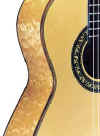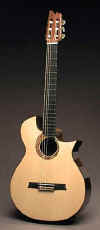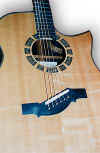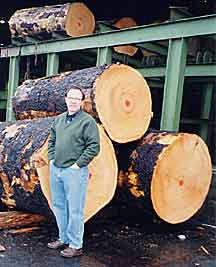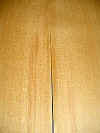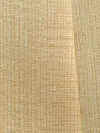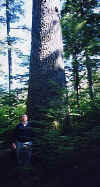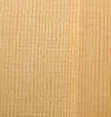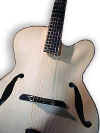SPRUCES
HOME ORDER ONLINE PRODUCTS REGISTER CONTACT US
Click Part No. to Add to order and/or to see info andEuropean Spruce
Click on Part ID to add to shopping cart
PART No. Description Price Ea. 6 - 12
13 - 24
Steel string, best $150.00
Classic, best $140.00
Steel string, fine $120.00
$100.00
Classic, fine $110.00
$90.00
Steel string, good $75.00
$60.00
Classic, good $70.00
$60.00
Engelmann Spruce
Price Ea.
3+ Steel string, best $80.00
—
Classic, best $75.00
—
Steel string, fine $60.00
$56.00
Classic, fine $60.00
$56.00
Steel string, standard $32.00
$28.00
Classic, standard $32.00
$28.00
WSEN2
Steel string/classic, 2nd (export grade) Inquire
Sitka Spruce
PART No. Description Price Ea. 6 - 12
13 - 24
Steel string, best $80.00
— Steel string, fine $60.00
$57.00
Steel string, good $35.00
$31.00
WSS2A
Steel string, 2nd, export grade Inquire
Adirondack Spruce
Each 6 - 12
13+
WSADJ3A
Steel string, fine See Weekly Special
Classic/00, fine $80.00
$65.00
Steel string, good $95.00
$80.00
Steel string, standard $70.00
$65.00
Carpathian Red Spruce
Each 6 - 12
13+
WSCRJ4A Steel string, best $130.00 Steel string, fine $95.00 $90.00 Steel string, good $75.00 $65.00

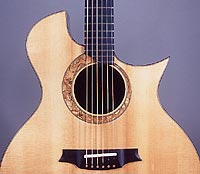
Mike Doolin's Sitka faced guitar. Mike likes a little color.

European Spruce, above
Engelmann spruce/birdseye maple guitar by Kenny Hill. Click to enlarge.
Sitka spruce blocks await resawing at JAS Tonewoods. Click to enlarge
A Doolin guitar with Engelmann spruce
Ervin Somogyi guitar of Sitka spruce, nicely "bear-clawed" with Novax multi-scale fingerboard.
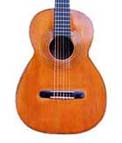
1869 Francisco Gonzalez guitar repaired by Jeff Elliott, 1998 - 1999
European spruce is the traditional wood for guitar soundboards, although quality material is in short supply. We bring in only small quantities of the best material, hand selected by a noted builder from split logs. Runout, which is quite common from most commercial suppliers is kept to an absolute minimum. The European we offer is mostly Swiss and is harvested by hand in the winter. It's priced a little higher because of hand
Only a handful of mills can handle logs this size these days.
selection, but the costs end up being lower to you because whatever you get, you will want to use.
Soundwise, European is known for its complex overtones and quick response.
Our Engelmann spruce comes from Canada where conditions seem to be ideal for this species (Picea engelmanni). Generally a little heavier and stronger than Engelmann from the states, it's been sold as European spruce for years by some. (I spent some time with a gentleman in Spain who showed me his stash of beautiful "European" spruce, but the markings clearly
came from our company. How many hands it passed through before getting to him, I don't know, but imagine the handling fees!) It's becoming a wood of choice for many of the large manufacturers of less expensive guitars, because the mill ends up cutting thousands of lower grade tops to get a few hundred of the better grades. At the moment better grade tops are plentiful, but shortages are not infrequent.
Most of the Sitka spruce comes from Canada and Alaska, these days. This has become the traditional wood for steel string guitars simply because it is tough and strong, and it's much more easy to get good quality wood from these large trees. As well, many manufacturers have problems with the softer surface of Engelmann spruce or Western redcedar. Their craftsmen have to be extra careful to avoid dings and dents from workbench detritus. That's not to say that good sounding guitars aren't made from Sitka, many prefer it to the other spruces. Comments are often heard about its good midrange brightness and balance.
In the classic world, it's rarely used, but among a few of its devotees are fine classic builders John Gilbert and his son, Bill, and Grit Laskin uses Sitka on his classics, too.
Considered to be the holy grail in top woods, Adirondack or Red spruce is one of the most difficult woods to obtain in decent quality. With a very high stiffness to weight ratio, it's said to combine all the best qualities of the various spruces. The tops we offer are Northern Red Spruce from the mountains of Maine and New Hampshire. Our supplier chooses only prime logs growing without lean or bend, with centered hearts and regular growth. He tests acoustics at the source with a sledge hammer and uses only "singers" for musical instruments. The rest go to lower uses. In centuries past in the Italian Alps as the logs came down the snow-slews, the turners helping the logs around the corners would tag the ones that "rang" or "sang." At the bottom those would go to the violin-makers. Our supplier accomplishes the same task with their sledge hammer. You'll find all of the grades to have a sweet, clear voice.
We would like to say that we grade red spruce according to objective standards and not according to Adirondack standards. However, the trees are so limited in size and availability that an AAA in Adirondack or red spruce is more like a an AA grade in any other AA grade spruce top, be it Sitka, European, or Engelmann.
Red Spruce from the Carpathians Mtns.
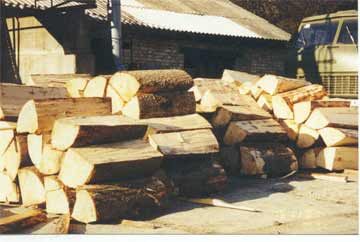
Carpathian red spruce logs await processing at the plant in the Ukraine. A couple hundred years ago, the story goes, a visiting monk took back some pine cones from the Adirondack range and with their seeds added to the other spruces of the Carpathians in the Ukraine. UPDATE: there was a lively discussion about this spruce on the Acoustic Guitar Forum, Luthier's discussion group, and it was decided that it's probably Picea abies, or possibly even Balsam fir. And there are even more stories to add to the misology!
It seems very much like the Adirondack that we see from the States and Canada, perhaps fewer knots and defects, but when well quartered seems as stiff as the Adirondack spruce. Like most Adirondack spruce the grain of this Carpathian spruce tends to be coarse, but in a recent shipment the grain was fairly typical of most Euro spruce. We're hearing very good things about this reasonably priced red spruce.
Mark Blanchard commented on a first shipment to him that he feels it's going to be a great top wood. "Less dense than Adirondack, with a higher stiffness to weight ratio."
About Runout
Me, posing in front of an old growth Sitka (in Alaska).
Below, Engelmann spruce. (Two pieces, hence the color difference.)
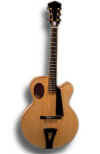
Arched guitar by Steve Andersen. European maple top. Click to enlarge

Above, Sitka spruce
In the white, the collaboration of Linda Manzer and Tom Ribbecke (more about that later)
Michael Millard, Froggy Bottom guitar of red spruce. Taken at an NCAL (Northern California Association of Luthiers) meeting at Klein's Sonoma music, Dec. 3rd, 2000.
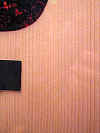
Address General Information Sales/support Telephone:
707-431-3760 POB 217, 101 C Grant Avenue, Healdsburg, Ca. 95448 USA info@alliedlutherie.com sales@alliedlutherie.com Fax:
707-431-3762

